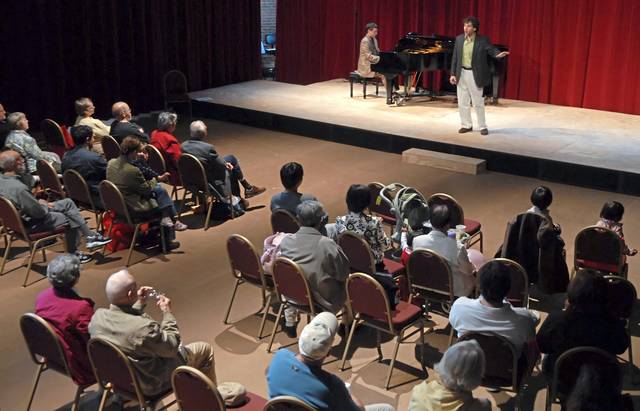https://triblive.com/aande/music/pack-your-brown-bag-lunch-for-free-pittsburgh-opera-performance/
Pack your brown bag lunch for free Pittsburgh Opera performance

The enjoyment of music hardly requires a formal setting, although traditional concerts can feel that way. But one of Pittsburgh Opera’s best traditions breaks that mold.
It’s called the Brown Bag concert series, because audience members are invited to bring their own lunches to the free midday events. And the audience sits at tables, not in rows of seats attached to the floor.
Pittsburgh Opera will present its first Brown Bag concert of 2020 on Jan. 4 at the company headquarters in Pittsburgh’s Strip District.
The program features arias and ensembles from operas by George Frideric Handel and Wolfgang Amadeus Mozart.
Most of the singers are Resident Artists this season – sopranos Caitlin Gotimer and Natasha Wilson, mezzo-soprano Antonia Botti-Lodovico, baritone Yazid Gray and bass-baritone Tyler Zimmerman — plus mezzo-soprano Laurel Semerdjian, an alumna of the program.
The stage director, Matthew Haney, is also a Resident Artist. Accompaniment will be provided by company associate coach and pianist James Lesniak.
The host will be William Powers, the company’s managing director.
Different styles
Pairing Handel with Mozart is smart programming because, although both are 18th century composers, they wrote in different styles. Handel is the best of baroque opera, with a more florid expressive style than the directness of Mozart, the best of classical (pre-romantic) opera.
Gotimer, in her second year as a Resident Artist, says she is excited, not surprisingly, to be starring in the title role when the opera stages Handel’s “Alcina” later this month. The two excerpts she’ll sing at the Brown Bag exemplify the arc of her character in the opera, which is what makes the role so interesting to her.
“She’s very, very powerful, manipulative and attractive,” says Gotimer.
Alcina is at the height of her power in the first aria, reveling in having the man she wants, a beautiful castle and much more. The trio Gotimer will sing with Semerdjian and Botti-Lodovico is from near the end of the opera, after Alcina has lost most of her magical power and become unexpectedly magnanimous.
The other Handel selections are from “Giulio Cesare” (Julius Caesar), “Orlando” and “Rinaldo.”
Opera high point
All of the Mozart arias and ensembles are from “The Marriage of Figaro,” a high point in the history of opera.
Gotimer will sing the famous aria, “Porgi amor,” which introduces the character of the Countess in an opera about her husband’s attempt to have his way with a servant about to be married, and the attempts of others to foil him.
“It’s the first thing she sings,” says the soprano. “There’s no recitative. All of a sudden, the countess sings a lamenting, vulnerable short piece. It seems like it would be very easy to sing, but making it through the phrases and giving each the emotion it needs is actually very difficult and requires technical finesse.”
Among the other Mozart numbers is the Act I duet in which Figaro brags to his fiancée Susanna about the room the Count has given them for their married life (and she sets him straight about how its location will make it easier for the Count to hit on her), the Count’s aria in which he plans how to outsmart his opponents (including his wife) and the romantic comedy’s vivacious finale.
Copyright ©2026— Trib Total Media, LLC (TribLIVE.com)
